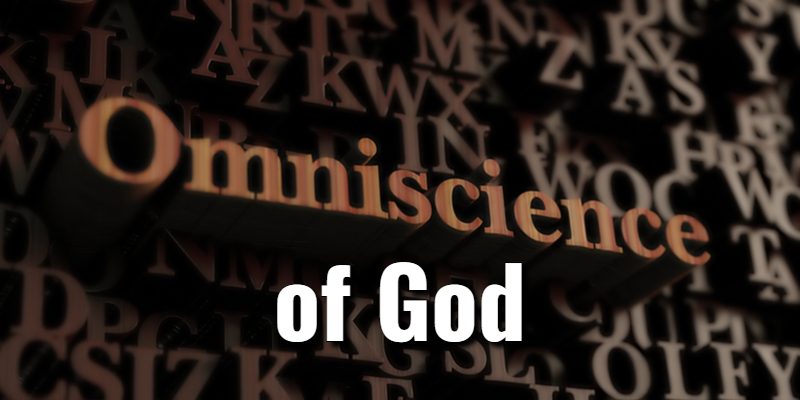In Matthew 19:26, Jesus tells us that “with God all things are possible.” This is one of many Biblical passages that testify to God’s omnipotence. But some atheists challenge that omniscience as one way of proving that God doesn’t exist. They ask this question (and others like it): “Can God create a rock so heavy He can’t lift it?” This is a “gotcha” question. If you answer “yes,” the atheist might say, “If God can’t lift the rock, He isn’t all-powerful. If He isn’t all-powerful, He isn’t God.” If you answer “no,” the questioner would make the same argument, pointing out that not being able to create such a rock limits God’s power, thus calling His existence into question. This is called the “omnipotence paradox.” It is meant to challenge God’s omnipotence, which would lead to deconstructing the view of God presented in the Bible. Other versions of the question are: Although such questions may seem silly, they can and have stumped believers. How should you respond?
Omniscience of God
A More Accurate Understanding of God’s Omnipotence
Such questions convey an inaccurate understanding of what is meant by God’s omnipotence. A common, but incomplete, understanding of omnipotence is the ability to do “anything.”
But therein lies the problem. Many theologians and philosophers (both Christian and atheist) would argue that this definition of omnipotence is too simplified to be accurate. The Bible frequently refers to God as the “Almighty,” so His omnipotence is certain. But even with all power, God cannot contradict His own nature. The Bible indicates, for example, that God cannot lie in Titus 1:2: “In hope of eternal life, which God, that cannot lie, promised before the world began;” God also cannot die. Referring to God, Paul says in 1 Timothy 6:16: “Who only hath immortality, dwelling in the light which no man can approach unto; whom no man hath seen, nor can see: to whom be honour and power everlasting. Amen.”
Being omnipotent does not mean God contradicts His own nature. If He could, He wouldn’t be God.
Word Games in the Omnipotence Paradox
Another problem is the illogic of such questions. For instance, a “squared circle” is not actually a thing. Putting those two words together doesn’t change that. The same applies to a two-sided triangle.
Asking whether God can create those is like randomly hitting letters on a computer keyboard, showing the result to someone, and demanding the person “answer.” “Answer” what? Putting together words and letters doesn’t equate to logical communication.*
Philosopher and theologian C.S. Lewis expresses this well in Chapter Two of The Problem of Pain:
“You may attribute miracles to Him [God], but not nonsense. This is no limit to His power. . . . meaningless combinations of words do not suddenly acquire meaning simply because we prefix to them the two other words, ‘God can.’ It remains true that all things are possible with God: the intrinsic impossibilities are not things but nonentities. It is no more possible for God than for the weakest of His creatures to carry out both of two mutually exclusive alternatives; not because His power meets an obstacle, but because nonsense remains nonsense even when we talk it about God.”
*It’s worth mentioning that seventeenth century French philosopher Rene Descartes was almost alone among philosophers in his view that God could carry out nonsensical concepts. This view is called voluntarism, and it is a minority position.
God’s omnipotence means He can do all that is logically possible and that does not violate His nature.
Resources to Address the Omnipotence Paradox
Lord’s Library has compiled a range of resources from those that omniscience of God question directly to others that go into denser discussions of what omnipotence actually is:
1st Thing Atheists Should Never Say! ‘Can God make a rock so big He can’t lift it?’ with Pastor Mike Winger
Pastor Winger hosts the popular Bible Thinker YouTube show (also a podcast). In this short video, he provides a clear example to show the flaw in the question itself.
‘Can God Create a Rock He Cannot Lift?’ by Cross Examined
In this brief clip, Christian apologist Frank Turek answers a student’s question about God’s power. The conversation touches on the issue of voluntarism, mentioned above.
‘Could God create a rock so heavy He could not lift it?’ by Got Questions
This contribution (text and video) from the Got Questions ministry dissects the terms involved in the omnipotence paradox, including the misuse of the words “almighty” and “omnipotent.” They also discuss the concept of “power” and the “ability” to do what is “impossible.” The explanation includes Bible scriptures.
‘Doctrine of God, Part 17’ from William Lane Craig’s Defenders Series
This hour-long episode from the Sunday classes of Christian apologist Dr. W.L.Craig is for those who want a deeper examination of God’s omnipotence. Craig lectures and takes questions from the class.
‘Maximal Power’ by Thomas P. Flint and Alfred J. Freddoso
This older (1983) academic resource is recommended by Dr. Craig for an in-depth examination of omnipotence. Flint and Freddoso are philosophy professors at the University of Notre Dame. This much denser resource indirectly addresses the omnipotence paradox by examining the nature of omnipotence itself.
In Jeremiah 32:27, God says: “Behold, I am the LORD, the God of all flesh: is there any thing too hard for me?” God truly is the Almighty, regardless of trick questions intended to prove otherwise.
Lord's Library participates in affiliate programs. We may make a small commission from products purchased through this resource.
- Intelligent Design vs. Evolution: Six Web Resources to Consider - October 3, 2023
- Microevolution vs. Macroevolution: Six Web Resources to Consider - September 9, 2023
- Atheist Objection to Theism #4: Presumption of Atheism Argument - August 21, 2023














